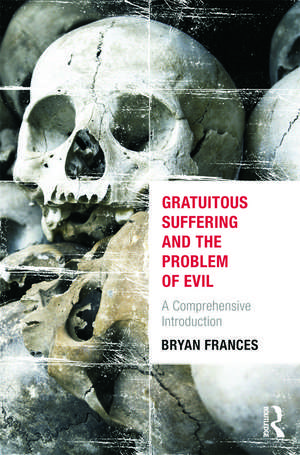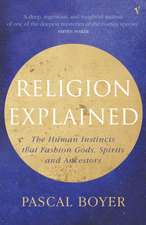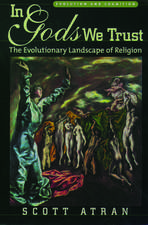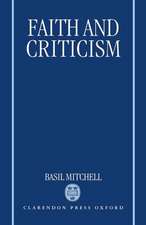Gratuitous Suffering and the Problem of Evil: A Comprehensive Introduction
Autor Bryan Francesen Limba Engleză Paperback – 26 mar 2013
The perfect size and scope for an introductory philosophy class’s discussion of the problem of evil and suffering, and deliberately crafted to be approachable by all interested readers, Gratuitous Suffering and the Problem of Evil is philosophy doing what it does best: serious, engaged, rigorous explorations of even the darkest truths.
The book offers many useful pedagogical features, including chapter overviews and summaries, annotated suggested readings, and eight-eight discussion questions.
| Toate formatele și edițiile | Preț | Express |
|---|---|---|
| Paperback (1) | 442.32 lei 6-8 săpt. | |
| Taylor & Francis – 26 mar 2013 | 442.32 lei 6-8 săpt. | |
| Hardback (1) | 1057.75 lei 6-8 săpt. | |
| Taylor & Francis – 26 mar 2013 | 1057.75 lei 6-8 săpt. |
Preț: 442.32 lei
Nou
Puncte Express: 663
Preț estimativ în valută:
84.64€ • 88.59$ • 70.45£
84.64€ • 88.59$ • 70.45£
Carte tipărită la comandă
Livrare economică 01-15 aprilie
Preluare comenzi: 021 569.72.76
Specificații
ISBN-13: 9780415662963
ISBN-10: 0415662966
Pagini: 208
Dimensiuni: 152 x 229 x 12 mm
Greutate: 0.29 kg
Ediția:New.
Editura: Taylor & Francis
Colecția Routledge
Locul publicării:Oxford, United Kingdom
ISBN-10: 0415662966
Pagini: 208
Dimensiuni: 152 x 229 x 12 mm
Greutate: 0.29 kg
Ediția:New.
Editura: Taylor & Francis
Colecția Routledge
Locul publicării:Oxford, United Kingdom
Cuprins
I. Introduction 1. The Need for Trustworthiness and Competence 2. Foreshadowing 3. Suggested Further Reading II. The Question is: Is There Gratuitous Suffering That Rules Out God? 1. The Problem of Gratuitous Suffering 2. The Gratuitous Premise 3. The Consequence Premise 4. The Logical Problem of Suffering 5. The Problem of the Inferior Universe III. Possible Theistic Responses to the Question 1. The Logic of Responses 2. The Five Approaches 3. Faith as a Response 4. Ignorance IV. The Confident Knowledge of God 1. What the Approach Says 2. Criticisms of the Approach 3. Evidence for the Approach 3(a). The Design Argument 3(b). The Cosmological Argument 3(c). The Social Argument 4. Lessons IV. God Permits Gratuitous Suffering 1. What the Approach Says 2. Criticisms of the Approach V. God's Reasons for Suffering Revealed 1. What the Approach Says 2. Knowledge 3. Free Will 4. Soul-Making 5. Afterlife 6. Original Sin 7. Lawfulness 8. Motivation 9. Divine Suffering 10 Lessons VI. Our Inability to see God's Plan 1. What the Approach Says 2. Criticisms of the Approach 3. Modifying the Approach 4. Lessons VII. God is not What You Think He Is 1. What the Approach Says 2. Conception of God as Unconscious 3. Conception of God as Morally Bad 4. Conception of God as Morally Unassessable 5. Conception of God as Epistemically Deficient 6. Conception of God as Weak 7. Conception of God as Non-Individual 8. Conception of God Involving Analogy VIII. Warranted and Unwarranted Conclusions INDEX
Recenzii
In a field filled with atheistic rants and rash theistic rejoinders this book is a breath of fresh air. I know of no other book that offers such a clear, entertaining, and levelheaded guide to thinking about the problem of evil. The arguments are clear, Frances's presentation is engaging, and the key issues are handled in a thorough and careful manner. It will be a valuable text for classes in the philosophy of religion, and will reward reading by anyone interested in these issues.
Robert Howell, Southern Methodist University
Robert Howell, Southern Methodist University
Notă biografică
Bryan Frances is Associate Professor of Philosophy at Fordham University.
Descriere
Gratuitous Suffering and the Problem of Evil: A Comprehensive Introduction is among the first book-length discussions of theistic approaches to the problem of evil. Bryan Frances’s lucid analyses of a variety of possible responses to the problem of evil will provide serious students or general readers much material with which to consider this ancient and contemporary concern.
The book offers many useful pedagogical features, including chapter overviews, study questions, summaries, and suggested readings.
The book offers many useful pedagogical features, including chapter overviews, study questions, summaries, and suggested readings.


















